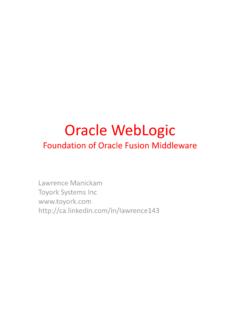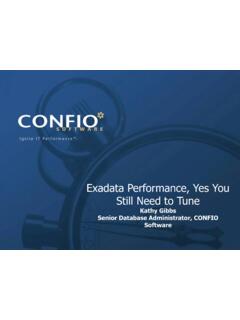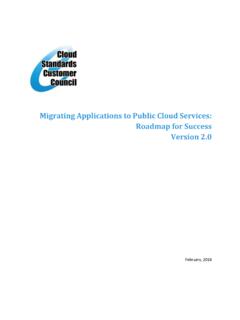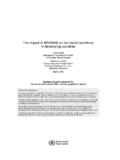Transcription of Aaron Werman aaron.werman@gmail - NYOUG
1 Aaron Complex integration of capital markets trading data Hundreds of ETLs, Thousands of tables 10K+ ETL executions per day, many highly complex Near real time SLAs ODS with data sharing for entire line of business Several web applications, each with multiple hundreds of users, doing reporting and analytic queries Business, not traditional BI, SLAs for availability and recovery All content is the opinion of the author, not my employer No endorsements are intended. All products mentioned are considered favorably by the author! Master Note (Doc ID ) Database Machine and Storage Server Best Practices Master Note (Doc ID ) Performance, migration , Backup Recovery Best Practices (Doc ID ) Database Machine Setup/Configuration Supported Versions (Doc ID ) Database Machine running Storage Server Software 11g Release 2 ( ) Key Issue: mixed workload .
2 Obvious candidates are Teradata, DB2, Netezza, Oracle for ODS and a column database for DW General concern: migration from Oracle entails time/cost and risk. Application is highly tuned to Oracle physical design Teradata concern: too small a use case for their sweet spot DB2 concern: migration , organizational issues, and new support issues Netezza: recovery model, fact/fact joins, mixed workload , tuning, LOB support New column database for reporting: organizational risk and current ODS I/O bottlenecks No other POCs were done! We chose Exadata based on migration risk avoidance Migrating from Oracle to another platform migration entails significant schedule risk Scaling Oracle ourselves is not justified by cost / risk / technology stack (but may be less painful in terms of corporate architecture) Potential loss of business capability and likely miss of critical SLAs if we do not scale adequately Current gaps in corporate SAN engineering to support VLDB (and 100TB applications) We created a small copy of the app in Oracle 11g and tested for functional gaps No issues were raised despite some of our stack (Informatica )
3 Not being certified for 11g) Key issues are time to migrate and disk space requirements and complexity We rejected RMAN Oracle 10g single instance Exadata Requires migration to 11g, ASM, too many steps We chose to use exports: data pump (network) for almost everything export classic for large LOB tables Be careful about considering ASM storage as a file copy target there are limitationsXInformaticaCognosJavaIIS, .NETO racle Physical Dataguard (TCP/IP)PrimaryDRMQ, WMBEMC SRDF Synchronous ReplicationfilesfilesfilesfilesfilesXInf ormaticaCognosJavaIIS, .NETMQ, WMBfilesfilesfilesfilesfilesSome major bugs encountered: 9356344 High CPU utilization of process with CRS-2409 9338087 ASM AND DATABASE HANG - CONNECT: OSSNET: CONNECTION FAILED TO SERVER, RESULT=5 9324531 ORA-00600.
4 Internal error codeThese are now part of the current Exadata Oracle release Most due to SQL optimization differences between Oracle 10g and 11g ~40,000 SQL statements in app68 statements identified as substantially slower_____37 considered non-SLA relevant and ignored31 important SQL statements with significant SLA impact 26 resolved using profiles 3 resolved using hints 2 resolved by query rewrite optimizer_use_sql_plan_baselines? Note that most statements improved in performance, and improved in proportion to how much work/time they took Our DBAs, based on prior RAC strategies, initially partitioned the app to segregate load and prevent potential lock/block overhead After tuning, we determined there was no gain, and all load was allowed across all nodes Your mileage may vary Really complex to implement in our enterprise Disruptive technology requires change in strategy for many stakeholders.
5 Especially infrastructure support groups Include time in your plan to allow for the transition Include ALL stakeholders in your planning Application changes, such as reducing our real time ETL SLAs by 2/3s Index removal We will experiment and remove many for purpose indexes Incremental strategy with sufficient testing required ILM using Hybrid Columnar Compression Reducing duplication of data between operational and reporting requirements Likely BI (read-only reporting) against disaster recovery site using Active Data Guar












